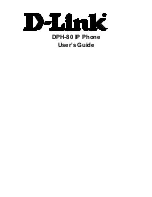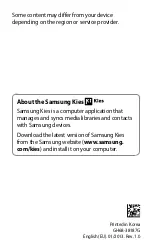
Copyright 2010-2015 Obihai Technology, Inc.
160
[^ ]
Exclusion Set
An exclusion set includes a leading caret, or “hat”, within a set of
“square brackets” - [^ ]
An exclusion set matches any single alphanumeric character that is not
within the set.
Example:
To match any arbitrarily long sequence of digits that does not start with * we would write our
matching rule as follows:
[^*]xx.
In the case of Sydney, Australia, local numbers are 8 digits long, starting with any digit between 3 and
9. We could write this rule as [3-9]xxx xxxx or using an exclusion set we could write:
[^0-2]xxx xxxx
!
! Call Bar
To bar users from calling numbers that match a rule, add an
“exclamation mark” - ! - in front of that rule in the digit map. The rule is
then referred to as a
barring rule
.
Example:
If we wish to bar all calls to 1900 numbers (regardless of length) we could use the following rule:
!1900xx.
<
elements
:
literals
>
Element to Literal Transformation
An element-to-literal transformation allows us to substitute the digit
sequence matching
elements
with the given
literals
. The expression is
contained within a set of “pointy brackets” - < > - and elements are
separated from literals using a colon :
Usage Notes:
Single quote ‘ ‘ syntax is NOT needed or allowed for the
literals
in this context; special characters may
be used here as they do not apply in this context either.
Elements can be empty, in which case the colon - : - may be omitted. This case is useful for inserting
some extra digits in certain part of the dialed digits.
The literals part can be empty also but the colon - : - MUST NOT be omitted. This case is useful for
removing part of dialed digits.
Elements
and
literals
MUST NOT both be empty.
Example:
This rule can be used to either remove digits from a dialed number, add digits to a dialed number or
transform a dialed number. First, let's look how to transform one number into another. In this case
we are going to transform the entered digits of 112 to send out 000. To do this we would write:
<112:000>
take 112 and replace it with 000
Next, let's strip off preceding digits in a number, in this case if a user dials 02 xxxx xxxx let's send on
just the xxxx xxxx without the 02:
<02:>xxxx xxxx
take 02, replace it with nothing then match the next 8 digits
If we want to add to the start of a dialed number, for example to add 02 to the start of an 8-digit
number, we would write:
<02>xxxx xxxx
or
<:02>xxxx xxxx
S, S0, S1 … S9
Digit Timer
















































